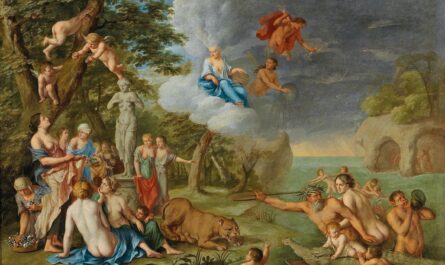By “Best Ideas,” I don’t specifically mean the best ideas for this particular year or that these ideas are especially timely. Rather, these are the top ideas and arguments I’ve come across in the first half of this year. Some mark a significant change in technology or innovation. Some – most – are old ideas said in a novel way; others just tickled my brain in a particularly interesting way.
One
As neurotechnology becomes ever-more sophisticated, the breakthroughs enabled increasingly come up against ethical concerns. Recently, scientists were able to decode a string of thoughts from a human subject. Is this ethical? What are the options and protections for people subjected to brain imaging technologies?
Two
Flaubert and his distaste for normal life. This piece reviews a new edition of his letters, and describes how the author despaired of ‘real’ life and the mediocrity of most people, instead striving to create wondrous worlds in his fiction. This piece sort laughed about Flaubert’s world-weariness in a knowing way. However, I would go one step further than they author did. Discontent with the world and a desire to create and appreciate beauty are the things which must drive any creative person. It’s what makes the work of ‘creating’ worth it – you have a new creation fully realized. All the more important in fiction, where you’re building from the ground up.
Three
Perhaps you also saw headlines at the start of the year about a California woman allegedly stealing $2500 worth of Stanley cups to sell. Why did the Internet suddenly go cuckoo for a water bottle that’s been around for decades? Given this example of artificial scarcity driving the Internet into a frenzy, I wonder how much of our global economy is powered by simple boredom? It must be a significant percentage.
Four
In decades past, reading was not simply an activity one did out of a desperate attempt to banish boredom, but was a gateway into participating in most social settings. People gathered to read excerpts of famous or popular novels and texts at parties and a smattering of knowledge about popular books was expected in polite society. However, it seems those days have mostly passed. Should we be concerned? Ursula K. LeGuin on “The Alleged Decline in Reading”.
Five
“Spend more time thinking about what to concentrate your efforts on.” Good word.
Six
This piece celebrates the joys and rituals of reading print publications. In the same vein, I’ve been opting for the “print + digital “option recently on my subscriptions, and am enjoying being able to end the day on the couch with a print magazine and mug of tea. I find magazines particularly satisfying because they enable you to read on a topic you would not normally seek out, but the editorial process of the publication means everything you read there is quality information.
Seven
This short article demonstrates the concept of Second- and Third-Order Effects; the eventual web of changes made in response to one initial change. Here we take an unexpected look at how the Cold War shaped American football and the Superbowl.
Eight
A reminder (to self) of the fact that owning a smartphone is a choice.
Nine
“In fact I now regret that so much of my reading took place during my late adolescence, long before I had any adult experience of the world, long before I had fallen in love, learned to understand my parents, earned my own living and had time to reflect on the world’s ways.” J.G. Ballard offers his favorite books and his perspective on having read the classics at such a young age.
Ten
A modern, book-loving problem, yes; “The only thing that really works for finding books I will actually read, is the bookstore chair.” Making bookstores a place where people actually want to enjoy the product is a great way to move more product – who’d have thought?!
Eleven
This is what service journalism looks like. The folks over at The City were concerned the limitations of being a digital-only magazine were keeping people in their local community from benefitting from their journalism, and that not having updated information was potentially putting those people in danger. So, the journalists got creative. When they ran a story about areas in the city deregulating heating, “[t]o locate the most relevant neighborhood to the story, we used 311 call data to find the New York zip codes with the most heat-related complaints per person. Then, we sent the guide to nearly 1,400 addresses via postcards.”
Twelve
An overview of the many stories, mysteries, and histories in which horticulture and homicides are interwoven. I found this duality of plants and gardens being an instrument of life and/ or death to be fascinating.
Thirteen
“The man who used Nazi propaganda to help the Allies win.” Instead of lecturing people, Delmer found a way to help persuade them by using the same propaganda the Nazis employed, pushed to its limits of plausibility. This ultimately broke the illusion and showed many people just how artificial and manufactured the Nazi party lines were. The mental gymnastics people had to go through to listen to the broadcasts “had them bend their minds out of the passive state that Goebbels wanted.”
Fourteen
Last year I posted about the imperative art of selecting the conversations one chooses not to be involved in. We live in the Age of Information Abundance, where knowledge is only ever just a click away. Seth Godin asks, “What have we chosen not to know?”.
Fifteen
The long and strange history of ketchup – from being a mushroom-based sauce to Heinz’s changes – and how it has become so popular global sales are expected to top 37 billion dollars in 2024 alone.
Sixteen
How the first Pulitzer Prize for poetry came to be. The interesting idea here is that poetry’s initial exclusion was considered a scandalous oversight, in light of the fact a prize for editorial work was specified. Yet, less than a century later poetry’s popularity has plummeted. Why?
Seventeen
“Dare to be wise!”; what Immanuel Kant anticipated about thinking and the algorithm. This piece argues that Kant’s ideas about public and private uses of reason explain one way in which algorithms used online (among other things) undermine a truly open public discourse.
Eighteen
What do Richard Feynman, Le Corbusier, and Frank Lloyd Wright have in common? They all received a remarkably similar, specific kindergarten education. Lawrence Weschler shares an odd note of history about the influences of Friedrich Froebel’s kindergarten theory on first-rate artists, The Kindergarten of the Avant-Garde.
Nineteen
Writer and photographer Craig Mod on the Continuous Uninterrupted Solo walk and having the experience of a thing before you can describe the thing.
Twenty
This year marks a historic shift in journalism; “For the first time ever, more online news sites produced Pulitzer finalists than newspapers did.”
Twenty-one
Thoreau’s seven principles for living deliberately, including not allowing yourself to become “a tool of your tools”. I really like the encouragement to not purchase things that get in the way of doing the things you actually want to do or find more important.
Twenty-two
This article touches on the silo-effect areas of study, such as science and history, have developed. This researcher says she’s discovered the location in the background of the Mona Lisa by looking across disciplines.
Twenty-three
“At times of crisis, confusion and complexity, our faith in traditional and rational institutions collapses and we look for salvation and redemption in the irrational allure of certain individuals.” This piece is an engrossing theory of charisma, a term often-used, but ill-defined.
Twenty-four
“People spend too much time on the last 24 hours and not enough time on the last 6,000 years.” — Will Durant
Twenty-five
The ‘complicated’ legacy of Margaret Cavendish. This piece highlights tension inherent in living a truly human life, as opposed to being a caricature; we all hold opinions and make choices others will applaud and abhor. This was true in the 17th-century, it’s true now; it remains true of historical figures especially as public sentiments continue to shift over time.
Photo by Layne Lawson on Unsplash




